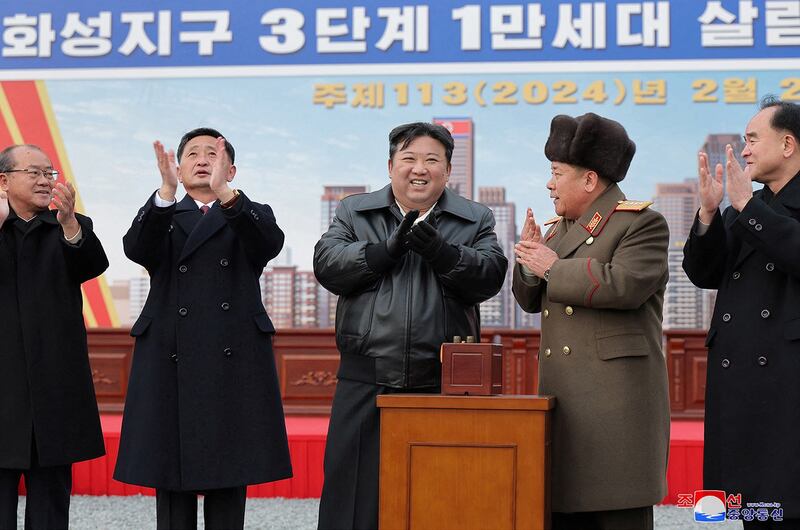Rural factory workers in North Korea are doing whatever they can to avoid being conscripted as construction workers on a major state project to build tens of thousands of homes in the capital of Pyongyang because the hours are long, the conditions are harsh and they cannot return home even in emergencies, residents told Radio Free Asia.
Normally people would consider it a privilege to be sent to Pyongyang, as only the elite and well-connected are allowed to live there and only the most loyal of people from the provinces are ever allowed to visit.
But as construction workers, officially called “stormtroopers,” they are made to toil endlessly on supreme leader Kim Jong Un’s pet project that promises 10,000 homes in the capital per year over a period of five years.
Started in 2021, the project is entering its fourth year, and has been rife with setbacks, fatal accidents, and a lack of food so severe that workers resort to crime to feed themselves.
Most stormtroopers are people in the military, but the project is such a priority that the government also diverts workers from among the civilian ranks.
Bribes and sacrifice
To avoid going to Pyongyang, workers in factories are even trying to bribe their way out of it, the residents told RFA.
“Each factory and company is busy preparing shift workers to go to join the housing construction stormtroopers in Pyongyang,” an official from a company in Onsong county, in the northeastern province of North Hamgyong, told RFA Korean on condition of anonymity for security reasons.
He explained that the next crop of workers will need to replace those finishing their six-month tour at the end of this month.
“We need to confirm the manpower to be mobilized within this month, but no one wants to go,” the resident said. “There are quite a few factories that determine who gets chosen by drawing numbers. But many workers insist that they cannot go with various personal excuses when their number is called.”
A man in his 30s was selected from the resident’s company, but he tried to defer because his wife is expected to give birth in May, the resident said.
“No one wanted to change turns with him, so he ended up paying 100,000 won (about US$12) and was barely able to change his turn with another worker,” he said.

Even if they aren’t among those sent to Pyongyang, the factory workers must sacrifice for the project.
“Confirming the number of people to be sent to the Pyongyang construction stormtroops is not the end,” the resident said. “We need to prepare items for them such as their work clothes, raincoats, and boots to be used during long-term dispatch as well as their pocket money.”
The next batch of stormtroopers will head to Pyongyang in early April, he said.
Even if they complete their six months, there still remains the possibility that a conscripted stormtrooper will have to work for more than a year, a resident of the northern province of Ryanggang told RFA on condition of anonymity to speak freely.
“Everyone doesn’t want to go to the stormtroopers,” he said. “Stormtroopers are never sent home before the arrival of their replacements from the factories. There are many cases where they don’t arrive on time and the workers are stuck there for more than a year.”
Translated by Claire S. Lee. Edited by Eugene Whong and Malcolm Foster.
